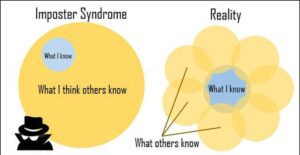Fake It ‘Til You Make It? More Like Fake It ‘Til You Become It! by Emma Burck

“How did I get here?”
It was a random Tuesday afternoon when I had a moment of self awareness and thought to myself: “Am I really here right now?” I had been in service for about two weeks by then. I was sitting in a conference room listening in at one of the DEQ staff meetings. As a Rural Energy Outreach coordinator, meetings and conferences are weekly obligations. I looked around the colleagues sitting in the room, seemingly engaged in what was being discussed at the time, which clearly I wasn’t paying enough attention to because I haven’t a clue what we are talking about. What triggered this episode of my self awareness really wasn’t anything but simply the fact that I realized that I may have overdressed for this meeting. Prior to starting my service, I had imagined that my coworkers would be dressed like people working at Wall Street. So as one would do, I rearranged my workwear wardrobe to look the part. I figured even if I may not know what is going on I can at least look like I belong. Now I am overthinking… Although I am not a medical professional, according to Dr. Google, I am suffering from what people called the Imposter Syndrome. 
Who’s the Imposter?!
The scholar definition of Imposter Syndrome is a fear of being seen as a fraud after having attained professional and academic success. In my experience, I would define it as stated but without the second half of “having attained professional and academic success.” It’s more like pretending to be someone or something that I am not. As a southeast Asian myself, we are often stereotyped as studious, smart, successful and so fourth. Especially if you wear glasses, which I have done for as long as I can remember. The pressure from being the model-minority stereotype has pushed people to many great accomplishments, but it didn’t seem to have the same effect on me. The feeling of inadequacy has always been a part of me for as long as I can remember. Not just jobs, even just a compliment as little as “You look nice today!” can send back thoughts of doubts. I am the type of person to reply with: “Nooo I am not, you are too nice” and proceed to question their sincerity behind that comment.
I am sure that everyone has felt this way before, unless you are Donald Trump…when one encounters a person he or she deems as “better” than them, one has the inexplicable urge to get smarter, grow stronger, or be funnier. This is especially prevalent in today’s self-improvement culture where gurus and life coaches are a mouse-click or phone-tap away. A recent study shows that more than 80 percent of people have experienced imposter syndrome at some point in their lives. That goes to show just how common imposter syndrome is, despite how much it makes people feel isolated from others.
Fake it ‘til you make it
Tom Hanks from the movie Forrest Gump once said: No matter what we’ve done, there comes a point where you think, “How did I get here? When are they going to discover that I am, in fact, a fraud and take everything from me?” The two time Academy Award winner and world famous actor said in an interview with NPR: “It’s a high-wire act that we all walk. There are days when I know that 3 o’clock tomorrow afternoon I am going to have to deliver some degree of emotional goods, and if I can’t do it, that means I am going to have to fake it.”
Funny enough, I find the “Fake it til you make it” technique to be extremely useful when combating imposter syndrome. In the following section, I am going to break down the tricky techniques I use to fake it ‘til you make it while avoiding the imposter syndrome side effects. Disclaimer: do not try this at home! It’s important to note that this is not a one size fits all or the ultimate solution to combating imposter syndrome. So reader’s discretion is advised!
But first, what does it mean to “fake it til you make it”? In my experience, it means to borrow a little confidence from my future self, to pretend I know what I am doing until I generate the necessary confidence and knowledge I need. Even if I am internally screaming and crying, you wouldn’t be able to tell unless you look too close and spot my trembling hands.
Relating this to my service experience so far, fake it ‘til you make it has helped me tremendously. After hitting the apply for position button, I was all fired up and fueled with passion and excitement to make a difference. I said to myself that: if I get accepted, I will commit to doing as much good in the next year as I could. However, at the same time I was full of self-flagellation and doubts. Given that I have no idea about the energy field, I was worried that I wouldn’t have the ability to take on this role which is bigger than I am used to. I was worried that I wouldn’t get accepted for the position. After I was accepted I was worried that I wouldn’t be competent for the job. I am very familiar with these feelings at this point, so to make sure they don’t get in the way of my service year, I decided: time to activate my “fake it ‘til you make it” mode!
Fake it ‘til you become it
The first stage to the art of fake it ‘til you make it is: PRACTICE! I am going to act as if I know what I am doing, and in order to do that, I need to clearly understand “whom” I need to become. After identifying my skill sets and knowledge gaps. I spent many afternoons studying about energy and took advantage of online resources. I broke down my position description; what I need to “practice” to be an outreach coordinator, and took notes on the outreach strategies I can use. Through it all, I was stunned many times with frustration about how little I know about energy, but it only turned into motivation to learn harder.
As I rushed to hit the ground running for the first two weeks of service, I wanted to get more work done, so I acted as if I am a productive person. I wanted to make friends with my coworkers, so I behaved like a friendly person. It worked like a charm and didn’t take much effort because my colleagues are very friendly and always willing to provide me with assistance. The studying I did prior to starting my service paid off as well, I was able to understand (some of the time) what’s going on. I took notes on how my colleagues work and learned from them. The trick to this stage is: as you are “practicing” to be the person you want to become, it also changes the way you feel and the way you think. You are slowly becoming that person you desire to be.
Face it ‘til you make it
So, I’m back in the conference room; while everyone else seems to know exactly everything the presenter is talking about and giving insights, I felt like a waste of space in a room full of Harvard graduate geniuses who couldn’t possibly think of me belonging in the same room with them, not to mention that I am the youngest person in the room. I felt like a kid playing pretend and wearing “grown up” clothes trying to fit into a world that seemed both intimidating and full of uncertainty. Suddenly, this wave of anxiety came over me and the insidious nagging of worry started creeping in. “Am I really qualified for this?”
This is when I pulled out the “smile and nod”, but I didn’t stop there. I paused for a minute, took a deep breath and face the fact that I have no idea what’s going on. Then I wrote down the questions that came up so I can either ask on the spot or go over it with my supervisor. If I don’t have anyone to turn to, I googled it. The point is, by facing these challenges and asking questions, I reframed these situations as a chance to learn. The more I learned, the more confidence I gained. Two months in, service became much easier as I became better informed about energy and more efficient at managing my imposter syndrome. I am by no means cured but I am able to push through (most of the time) and get back to work.
Then the most obvious, asking my supervisor or mentor for guidance would be the first thing I would do. Given that they’re more likely to have the knowledge and ability to help you, in the context of your current position. Ask what your supervisor is expecting from you, ask follow-up questions about the project you are leading, or work out a system to measure your successes.
This is a reminder that most people don’t expect a fresh out of college grasshopper to know everything, or even anything, matter of fact. By being honest, you will soon find out that your supervisor probably has been there and done that, and will most likely have some good advice to offer.
In a nutshell
There is an old Italian proverb that goes like this: “The beard does not make the philosopher.” This is a common saying that suggests that superficial appearance isn’t a long term solution but it’s diligence and hard earned knowledge that makes you a virtuoso. You can only fake it to a certain extent, until you cross the line and it’s just flat out lying. I think it’s self-explainable the difference between faking a smile at a party V.S. faking the confidence to pilot a plane when you have no clue. It’s not fake it ‘til you make it, but more like fake it ‘til you become it! It’s about showing up with confidence and putting in the work to learn from previous experiences and actively develop new skills, which will feed back later to warrant your confidence. By acting as if you are what you are supposed to be, where you are supposed to be, and face it ‘til you make it, you will be in a better mental state to actually devote yourself to develop skills.
To summarize my vlog, I want to take a moment to quote the famous philosopher Lady Gaga: “I used to walk down the street like I was a f-ing star… I want people to walk around delusional about how great they can be – and then to fight so hard for it every day that the lie becomes the truth.” So basically the point I am trying to deliver… If you are still reading, I hope you find this blog slightly helpful!
Thank you for making it to the end, and good luck with all your future endeavors!
 Blog
Blog 